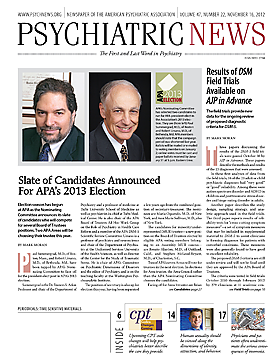One of the questions we are asked most frequently is “Why should I join APA or remain an APA member?” or “What am I getting for the dues I pay?” These are important questions in the current climate of economic stagnation along with the mushrooming of numerous small and large organizations that many of us belong to. Generally there are three important reasons for belonging to a professional organization such as APA: professional identity, material benefits, and the organization’s vision for the future. We will briefly cover each of these.
First, for psychiatrists, membership in APA shows our professional identity and support for our profession. APA is the oldest medical society in the United States, the largest psychiatric organization in the world, and the nation’s leading voice on psychiatry for the medical and academic communities, government, media, and the general public. No other organization represents psychiatrists the way APA does, with its 36,000 members. We know all too well that 1 in 4 people suffers from a psychiatric disorder, and our patients and their families have to deal with social stigma as well. APA plays a key role in bringing the psychiatric community together to serve these individuals.
For members who want to play an active organizational role in APA, there are multiple avenues such as joining one of the APA caucuses, serving on a council or committee, or running for an office at the local or national level. APA also offers ample opportunities for career recognition and support, such as through the APA Fellowship and APA Distinguished Fellowship designations. Fellows and Distinguished Fellows are honored each year at APA’s annual meeting during the Convocation ceremony.
For early career psychiatrists, membership provides valuable resources to help start a practice or find a job that advances one’s career. Learn more by going to
www.psychiatry.org and selecting the “Join & Participate” tab.
Next, there are a number of important material benefits that APA membership provides. The monthly American Journal of Psychiatry (AJP) and the biweekly Psychiatric News are free for members. AJP is the most widely read psychiatric journal in the world. Published monthly, it is an indispensable resource for all psychiatrists and other mental health professionals who need to stay on the cutting edge of every aspect of psychiatry. Psychiatric News Alerts keep the members informed of any relevant new developments in the field occurring anywhere in the world.
There are discounts on subscriptions to other journals such as Psychiatric Services and FOCUS, The Journal of Lifelong Learning in Psychiatry. Members can earn CME credits and also fulfill Maintenance of Certification (MOC) requirements by reading FOCUS and by using the new free Performance-in-Practice (PIP) Physician Practice Assessment tools. Members also receive special discounts on hundreds of books from American Psychiatric Publishing, significant discounts to APA’s annual meeting and the Institute on Psychiatric Services, access to JobCentral, and group discounts on auto and home insurance, car rentals, office supplies, and participation in the APA-endorsed malpractice insurance program.
APA’s annual conferences are not only meant to provide CME credits but also to facilitate networking with colleagues from various parts of the world. A recent analysis revealed that members currently save approximately 90 percent of the actual cost of products and services provided by APA.
Finally, APA members share a common vision for the future of psychiatry. Only a large organization can conduct effective advocacy at national and local levels, collaborate with other large medical societies, and undertake long-term projects involving hundreds of psychiatrists, other physicians, and other mental health specialists from across the world, such as the development of
DSM. (
DSM-5 will be published next year, after a decade of planning and hard work.) The efforts put in by our members will continue to make a positive difference for people with mental disorders. We are in the midst of a health care revolution in which changes in technology, service delivery, and reimbursement practices are occurring at a dizzying speed. APA staff and members are continuing to advocate for our patients and our profession directly on Capitol Hill and in state legislatures. Such efforts already helped pass the landmark Mental Health Parity and Addiction Equity Act and changes to the Medicare Part D Drug benefit. We also work closely with our district branches around the country to help fight on other significant issues, including scope of practice. And did you know that in 2013, there will be major changes to the CPT codes? These are the codes used for billing and documentation for all insurers (see
Major CPT Coding Changes Coming Soon: Start Preparing Now). APA is working hard to help our members keep up with all these changes and new procedures. We are also working with the Centers for Medicare and Medicaid Services and private payers to make this transition as smooth as possible.
Besides continuing to serve our members, APA has multiple programs that extend to the public at large. For instance, the nonprofit American Psychiatric Foundation is active in public education through programs such as the PBS television series “Healthy Minds,” which helps advance understanding of mental illnesses.
Last but not least, APA provides a forum where U.S. psychiatrists can collaborate with colleagues from other countries to jointly develop plans to improve clinical practice, teaching, and research in mental health across the globe.
It is important to bring this discussion of membership benefits back to APA’s mission, which is to promote the highest quality care for our patients, to support psychiatric education and research, and to serve the professional needs of all psychiatrists. This is why your membership in APA is so important.
Individually we can go fast, but only collectively can we go far. Psychiatry’s future is bright, and so is APA’s. your participation in your professional association whose work benefits the entire profession and the patients we serve is vital. We encourage you to renew your membership or join APA today to keep the information and support coming. We also appreciate any and all feedback from our members. We will continue to strive to make APA a better organization—with your help.

Dilip Jeste, M.D., is APA president; James H. Scully Jr., M.D., is APA medical director/CEO; and Joseph Rubin, M.D., is chair of APA’s Membership Committee .

